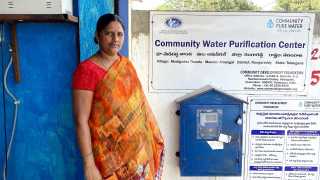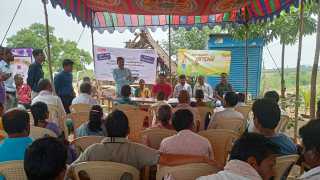Forty five per cent of India’s children are stunted and 600,000 children under five die each year, largely because of inadequate and unsafe water supply and poor sanitation, reads a report by UNICEF and Food and Agriculture Organisation (FAO).
One-third of all deaths of children under five years of age in India are due to diarrhoea and pneumonia. Many more children who survive have weakened immune systems and become underweight and malnourished, which has a severe impact on their learning ability throughout their lives.
At Community Pure Water, we believe that every child matters, hence caring for children’s healthy development is at the core of our mission. We work tirelessly to provide affordable access to safe water – for all, for life.
Water is essential at any age, but here are the reasons why safe water is crucial to children in their first five years, which can impact the trajectory of their lives, in the best or worst of ways.
Water Is Vital for Healthy Growth
At the earliest part of a child’s life, their bodies are sensitive to any type of deficiency and contamination. The body needs water for healthy joints, bones, teeth, immune system function and blood circulation. Most major organs depend on water to function well – even more than they depend on food. Organs such as the kidneys, brain, heart and lungs are all composed of at least 60% water. Safe water is a must for a growing baby.
In the first five years of life, brain functions like memory, critical thinking, and attention span develop more than any other time and depend heavily on water. This is why kids who don’t have safe drinking water have trouble learning in school – their brains and bodies don’t have the water they need to thrive.
The Ill-effects of Unsafe Water on Babies
Unfortunately, 700 million Indians rely on untreated water that leaves them vulnerable to dangerous water-borne diseases, and children under five are most at risk. Unsafe drinking water can have the following severe consequences:
- Gastrointestinal Issues: Babies who consume unsafe drinking water are at a higher risk of gastrointestinal problems such as diarrhea, vomiting, and stomach cramps. These conditions can lead to dehydration and malnutrition.
- Waterborne Diseases: Contaminated water often contains harmful bacteria, viruses, parasites, or chemical pollutants that can cause waterborne diseases. Waterborne illnesses like cholera, typhoid, hepatitis A, and rotavirus can have severe and potentially life-threatening consequences for babies.
- Impaired Growth and Development: When babies consume unsafe water, they may be exposed to toxins or contaminants that can hinder their growth. Malnutrition resulting from repeated bouts of diarrhea can also impair physical and cognitive development in the long term.
- Weakened Immune System: Babies exposed to contaminated water may experience frequent infections, as their immune systems are not yet fully developed. This can lead to a continuous cycle of illness, compromising their overall health and well-being in the long run.
- Neurological Impairment: Some water contaminants, such as lead, arsenic, or mercury, can have detrimental effects on a baby’s developing brain and nervous system. Exposure to these toxins through unsafe drinking water may lead to cognitive and behavioural problems, learning disabilities, and long-term developmental delays.
- Increased Mortality Risk: Unsafe drinking water poses a significant risk of mortality for infants, especially in rural India where residents may have limited access to medical care and sanitation facilities. Waterborne diseases, dehydration, and complications from contaminated water can lead to severe illness or even death.
The Importance of Access
Safe water is crucial not just to a child’s development but also to their education. Clean water helps kids stay focused in school and means fewer sick days, allowing them to receive a robust education. With close access to safe water, long trips to collect water aren’t needed, allowing children – especially girls – to stay in school. More time in the classroom, combined with the hydration that their brains and bodies need, leads to children who are happy and healthy and can look ahead to bright futures!








